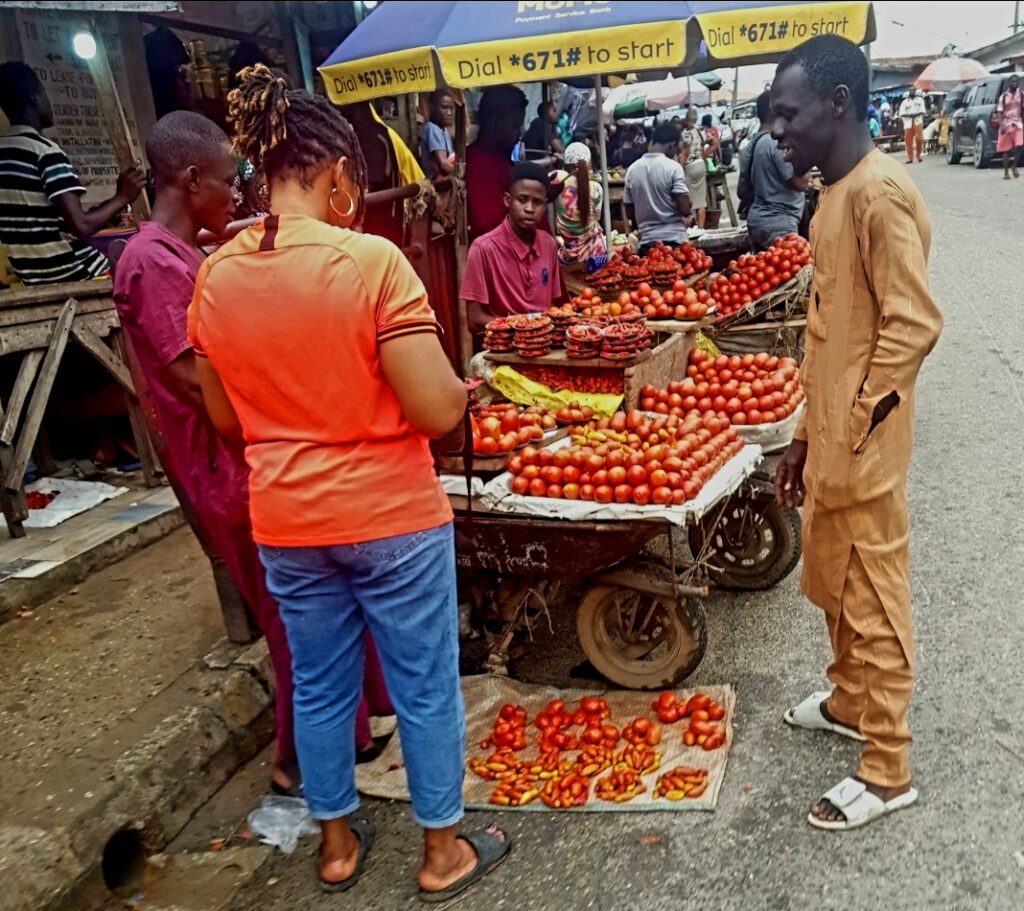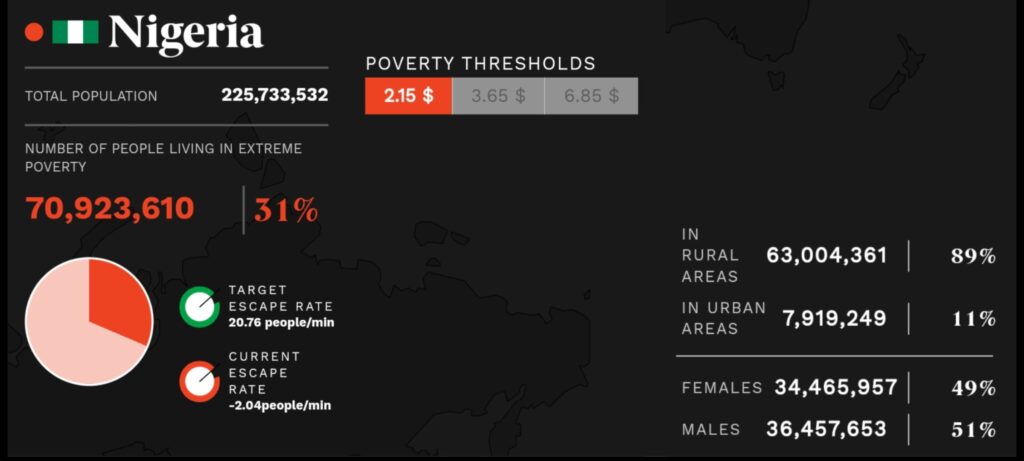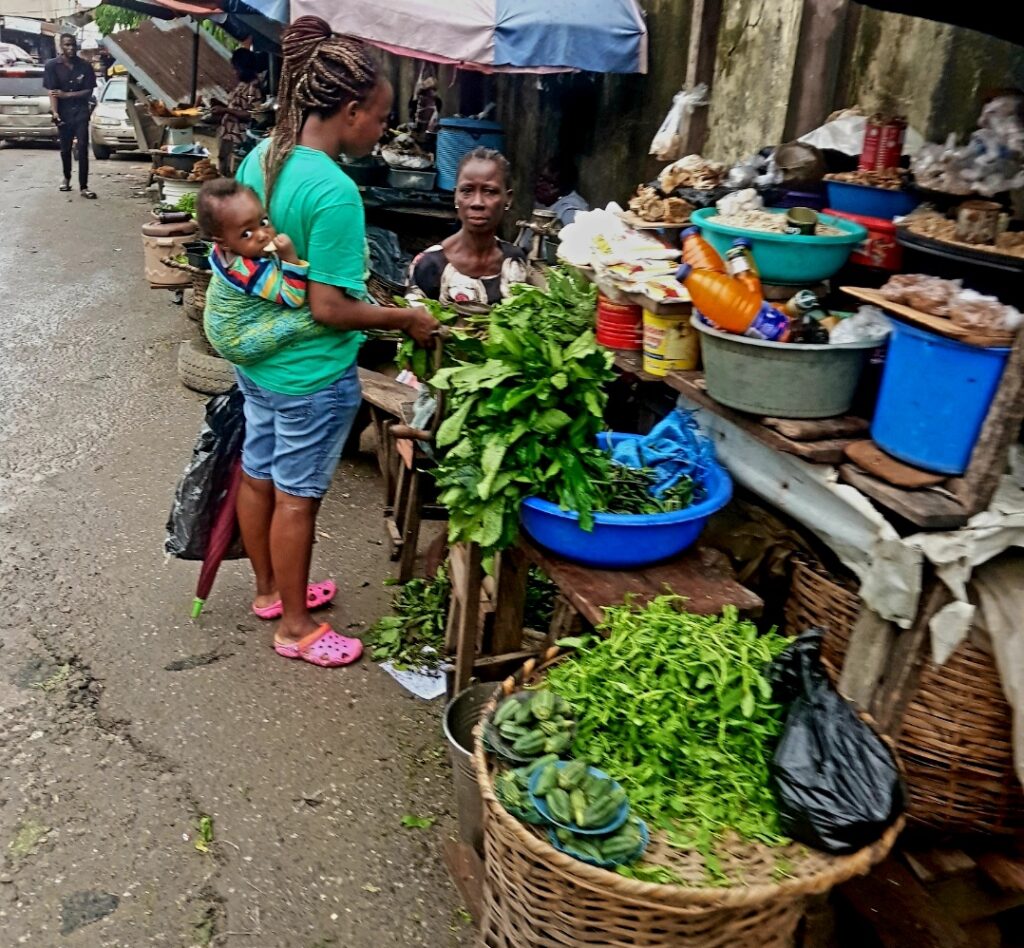Nigeria’s Food Security Dilemma: Lagos in the Grip of Malnutrition, Unmet Nutritional Needs under the Shadows of Hunger
In a world where sustenance has become a luxury, John Jayewole’s words resonated deeply. “Who’s looking for nutrients nowadays? You just eat because you need food to survive.” The harsh reality of Nigeria’s food crisis hit home as he shared his own struggle. “I wanted to buy eggs this morning, but the vendor asked for 500 naira for just three eggs. I had to walk away.”
In Africa’s most populous nation, the escalating cost of food has left millions grappling with hunger, their dignity and hope dwindling with each passing day. Inflation has taken hold, and the effects are devastating. Mothers sacrifice their own meals to feed their children, while farmers watch in despair as their harvests fail to meet even the most basic needs.
In rural communities, the once-thriving fields now lie barren, food stores empty. Families who once relied on subsistence farming now find themselves at the mercy of a capricious climate and an unyielding economy. Their lives are dictated by the unpredictability of it all, their futures hanging in the balance.
The search for sustenance has become a daily struggle, a constant reminder of the fragility of life. As the food crisis deepens, so too does the sense of desperation. In a world where food is a basic human right, the people of Nigeria are being forced to fight for survival, their dignity and hope hanging by a thread.
Similarly, Global Hunger Index (GHI), showed that Nigeria is the 16th most hungry country in the world among countries with sufficient data to calculate the 2023 GHI scores.
By Collins Odigie Ojiehanor.
The average price of a kilogram of rice in Lagos was N950 in April 2024, up from N620 in the same period the previous year. Beans saw an increase from N350 to N570 per kilogram, while the price of garri, a staple for many households, rose from N280 to N420 per kilogram according to the Selected Food Prices Watch for April 2024,. By June of 2024, these costs have doubled across markets in Nigeria in less than three months.
According to the National Bureau of Statistics (NBS), food inflation has consistently remained in double digits over the past few years, peaking at 40.66% in May 2024 on a year-on-year basis, which was 15.84% points higher compared to the rate recorded in May 2023 (24.82%). This surge in prices has worsened the struggle for many households to secure adequate nutrition.
This is a nation fighting a silent war against hunger, where every grain of rice and drop of oil is a precious commodity. In the midst of this nutritional crisis, the battle for survival grows more desperate by the day, painting a grim picture of a country on the brink. In Lagos, the country’s economic hub, the impact is acutely felt by both residents and traders with the current realities of Nigeria’s food situation.
Markets that were once bustling with the vibrancy of trade now echo with the sounds of despair and frustration. Stall owners lament the dwindling number of customers as skyrocketing prices make basic staples unaffordable for the average Nigerian. An average household in Nigeria tells a touching story: anxiously clutching empty wallets, work tirelessly yet still fall short of providing a single nourishing meal for their families. Malnutrition rates soar, leaving a generation at risk of stunted growth and diminished futures.
The government’s attempts to control inflation and provide food subsidies are met with skepticism and frustration, as bureaucratic hurdles and corruption often impede the flow of aid. As Nigeria battles with this nutritional crisis, the international community watches, the urgency to act has never been more apparent. The survival of millions hangs in the balance, demanding immediate and sustained intervention. This is not just a fight for food, but a fight for the very future of a nation.
Household Food Situation in Nigeria
Nigeria’s food situation is characterized by significant challenges. The 2023 Global Hunger Index (GHI) highlights the gravity of the situation, ranking Nigeria 109th out of 125 countries, with a score of 28.3, indicating that Nigeria is in a serious level of hunger. This means that Nigeria is the 16th most hungry country in the world among countries with sufficient data to calculate the 2023 GHI scores. The World Food Programme projects that about 26.5 million Nigerians will face acute hunger this year, a significant increase from the 18.6 million in 2023.
In a market survey carried out by our reporter across some major markets in Lagos state, prices of different staples stood at: white beans cost N8,000 per paint rubber, brown beans N9,000, rice N6,500, yellow garri N3,500, white garri N3,400, yams range from N2,000 to N3,500 per tuber, and palm oil, meat, fish, pepper and tomatoes all saw significant price increases.

Market traders are biting hard on the frontline of the economic crisis. Mrs. Sola Adekunle, who sells vegetables at the Mile 12 International Market, noted, “The cost of transporting goods has gone up due to fuel prices. We have to pass these costs on to customers, but many are buying less because they can’t afford it.” Another trader, Mrs. Oge Adebayo, lamented, “We are seeing fewer customers because people can’t afford to buy as much as they used to. The prices of food like rice, beans, and garri have nearly doubled in the past year.”
Fruits seller at Alapere market, Musa Danga explained that: “The cost of fruits has increased, making it difficult for people to buy. Customers just walk by, complaining about the prices. I end up with spoiled fruits, and it’s a significant loss for my business. This situation is really affecting my livelihood.”
“As a tomato seller, the price hike has been bad. A basket of tomatoes that used to sell for N40,000 now costs N200,000,” said Adamu Kala a seller at Alapere market. “This increase has reduced my customers. People can’t afford to buy tomatoes in the quantities they used to, so I’m left with a lot of unsold stock that spoils quickly.”
Staple food seller, Chinedu Okeke lamented that: “Items like rice, beans, and garri have seen serious price increase. Customers who used to buy in bulk now purchase just little. The reduced patronage means I have more goods sitting in storage. The high price is affecting people. Like now I do not have ground nut to sell because it’s getting too expensive. Government should help us bring prices down and make food affordable again.”
The availability of food is now a critical issue for many household in Lagos. Nigeria, despite its vast agricultural potential, still relies heavily on food imports. Disruptions in global supply chains, coupled with local production challenges, have led to periodic shortages of essential food items. This has further driven up prices, making basic foods less accessible to the average Nigerian.
Residents echo this sentiment. Mr. Festus Oladele, a father of four, shared his daily struggle: “I earn a modest salary, but it’s not enough to keep up with the rising costs. We have had to cut down on the variety and quantity of food we eat. Meat and fish are now luxuries oh my brother.”
Mrs. Amina Yusuf shared that: “Feeding my family has become quite challenging lately. Prices of essential food items have increased, and it’s hard to make ends meet. The recent floods in some areas in the North have also damaged many crops, making food scarcer and more expensive. We have had to reduce portion sizes and sometimes skip meals. I also try to buy in bulk when I can afford it, which sometimes helps save a little money.”
“I came to buy some tomatoes, onions, and pepper. The food situation has become quite difficult,” Chiamaka Obi revealed. “Prices have doubled for many items, and it’s hard to manage on a tight budget. As a student living alone, I have to be very careful with how I spend my money. I used to eat out sometimes. I also plan my meals in advance to avoid waste,” she added.
The relentless rise in inflation and the sharp increase in food prices have significantly impacted household expenses and consumption patterns across Nigeria. According to the latest Consumer Price Index (CPI) report by the National Bureau of Statistics (NBS), the headline inflation rate increased to 33.95% in May 2024, up from 33.69% in April 2024, marking a considerable jump from the 22.41% rate recorded in May 2023.
Current selected Food Price Watch data for April 2024 paints a stark picture of the economic pressures faced by Nigerians. The average price of 1kg of local rice surged by 155.93% year-on-year to N1,399.34, and saw a month-on-month increase of 3.47% from N1,340.74 in March 2024. Similarly, the price of 1kg of white garri increased by 134.98% year-on-year to N851.81, with a 13.59% rise from N749.89 in March 2024.
The price of 1kg of tomatoes jumped by 131.58% year-on-year to N1,123.41, and by 17.06% from N959.68 in March 2024. Additionally, the average price of 1kg of brown beans increased by 125.43% year-on-year to N1,387.90, while the price of 1kg of yam tuber surged by 154.19% year-on-year to N1,130.37.
The rise in Food inflation on a year-on-year basis was caused by increases in prices of the following items: Semovita, Oatflake, Yam flour prepackage, Garri, Bean, etc (which are under Bread and Cereals Class), Irish Potatoes, Yam, Water Yam, etc (under Potatoes, Yam and other Tubers Class), Palm Oil, Vegetable Oil, etc (under Oil and fat), Stockfish, Mudfish, Crayfish, etc (under Fish class), Beef Head, Chicken-live, Pork Head, Bush Meat, etc (under Meat class) according to the NBS report.
Analysis by zone showed that the average price of 1kg Rice local sold loose was highest in the South-west at N1,615.21. Similarly, the average price of 1kg of Garri white was highest in the South-south and the South-west at N1,031.19 and N 982.42, respectively. The South-south also recorded the highest average price of 1kg of Tomato at N1,689.40, followed by the South-west at N1,429.06, while the South-south and South-west equally recorded the highest average price of 1kg of beans brown (sold loose) at N1,594.84 and N1,579.64, respectively. This spike in prices has intensified the struggle for many households to secure adequate nutrition.

Household Income and Living Condition in Nigeria
Income levels and access to resources are essential determinants of food security and nutrition. In Nigeria, the economic downturn, aggravated by the COVID-19 pandemic and ongoing security challenges, has severely affected household incomes.
The Nigerian economy has been under pressure due to multiple factors, including fluctuating oil prices, foreign exchange scarcity, and high inflation. These economic woes have directly impacted household incomes. According to a report by the World Bank, over 40% of Nigerians live below the poverty line, with many struggling to meet basic needs.
In Lagos, where the cost of living is particularly high, residents are feeling the pinch. Ms. Joan Kelly Ilevbaoje, a University lecturer voiced her deep concerns about the harsh realities faced by ordinary Nigerians amidst soaring living costs. “The cost of living is very high. It’s really tough,” she lamented. “People are dying, people are falling sick, people are malnourished. People are not okay at all.” Joan emphasized the stark disparity between income levels and the rising prices of essentials, highlighting the urgent need for action.
“I don’t blame the Nigerian Labour Congress for their fight about the increment in minimum wage. Nigeria is due for that,” she asserted passionately. “I cannot imagine that in this economy presently somebody is earning 15,000 naira, 12,000 naira. Like it is crazy. Let’s just hope that things get better,” she said with a tone of cautious optimism. “But the living condition, the cost of living in Nigeria now is way too high. People cannot afford necessities anymore. People are living below standard.”
Mrs. Rita Njoku, a secondary school teacher, voiced her plight of the challenges faced by many Nigerian families as living expenses soar while incomes stagnate. “My salary has not increased in years, but everything else has become more expensive,” she laments with a sense of frustration.
In her heartfelt account, she reveals the harsh realities of trying to make ends meet in today’s economic climate. “It’s a constant battle to provide for my children,” she explains, highlighting the daily sacrifices her family must make. “We have had to cut out a lot of things from our budget. We used to eat fruits every day, but now it’s not so again.”
In a series of interviews, Residents from various walks of life expressed deep concerns about the country’s escalating economic challenges and their impact on daily life, especially in Lagos state. Loveth Peter highlighted the stark economic realities, stating, “The current income levels are insufficient to keep up with the rising cost of living. In Nigeria today, there is nothing like middle class; it’s either you’re rich or poor.”
Favour Samuel echoed these sentiments, emphasizing, “Income levels are alarmingly low in Nigeria, and accessing basic resources has become increasingly difficult. The cost of living has skyrocketed.”
Elizabeth Chiamaka added her perspective on the hardships faced, noting, “Given the current situation, life is incredibly tough. Basic needs like food are essential, but we also have other bills to pay, and our incomes are not keeping pace. Prices are rising, but our earnings remain stagnant.”
Edibo Eleojo expressed concerns about factors exacerbating these challenges on household income and cost of living, explaining, “The income of Nigerians has plummeted due to various factors, including the removal of fuel subsidies, exchange rate fluctuations, and rampant inflation across goods and services. As a result, the cost of living has tripled, plunging many into severe hardship. This has led to increased social problems such as crime, prostitution, and a notable trend of Nigerians seeking better opportunities abroad, popularly referred to as the Japa syndrome.”
The Global Alliance for Improved Nutrition (GAIN) April 2024 report highlights that the average cost of a healthy diet in Nigeria was N1,035 per adult per day in April 2024, an increase of 5.4% from the previous month. The cost is even higher in the South West, at N1,406 per day, compared to N781 in the North West. This disparity underscores the regional inequalities in access to nutritious food.
Nigerian Household Nutrition and Diets Patterns
The cost of maintaining a healthy diet has surged in Nigeria. In Lagos, the national average Cost of a Healthy Diet (CoHD) is among the highest in the country, reflecting the broader economic challenges faced by residents. The South West zone, including Lagos, has the highest CoHD at N1,406 per adult per day, compared to N781 in the North West.
The combined effect of rising food prices and declining household incomes has had a profound impact on nutrition. Malnutrition remains a significant problem, with children being particularly vulnerable. According to UNICEF, Nigeria has one of the highest rates of malnutrition in the world. About 37% of children under five are stunted, 7% are wasted, and 22% are underweight. These figures are alarming and indicate a crisis that requires urgent attention.
Many households have had to make significant dietary changes due to economic constraints.
The typical Nigerian diet, which includes a variety of grains, legumes, vegetables, and animal proteins, is becoming less balanced. More families are relying on cheaper, less nutritious foods.
Mrs. Chinwe Okeke, a mother of three, shared her experience: “We used to eat a lot of fruits, vegetables and fish, but now we mostly eat carbohydrates. Nothing is affordable. I worry about my children’s health. Many families have had to reduce the variety of foods they consume, focusing on cheaper options that lack essential nutrients. Meals that once included proteins, vegetables, and fruits are now primarily composed of carbohydrates like rice and garri” she lamented.

“Who is looking for nutrient nowadays. You just eat because you need food to survive” said John Jayewole. “Protein-rich foods such as meat, fish, and eggs have become expensive items for many households. I wanted to buy egg this morning, the woman said 3 egg for 5 hundred naira, I turned back”, he added.
For Mr. Tunde Adewale, he explained that: “I am here to buy yams, palm oil, and some spices. With the way prices are going up, I try to stock up whenever I have some extra money. The situation at home is tough; feeding a family of six isn’t easy. It has been quite stressful. We have had to switch to cheaper food options and cut down on meat and fish.”
Expressing his concern about the situation in his home, he shared that: “We eat a lot more cassava and maize flour now. Even those are getting expensive. It’s a daily struggle to ensure everyone gets enough to eat. The government needs to support farmers more and improve infrastructure so that food can get to the markets faster and cheaper. Also, tackling the issues of security in farming areas would help increase food production.”
The GAIN report also indicates that animal source foods, which are crucial for balanced nutrition, were the most expensive food group recommendation to meet, accounting for 36% of the total cost of a healthy diet in April 2024. Fruits and vegetables, while necessary for vitamins and minerals, were also costly, accounting for 11% and 16% of the total diet cost, respectively.
The rising cost of essential food groups has been particularly impactful. Vegetables, starchy staples, and legumes have seen the most significant price increases since October 2023, with vegetables alone rising by 81% according to the report. These increases have forced many households to adjust their diets, often compromising on nutrition.





Comments